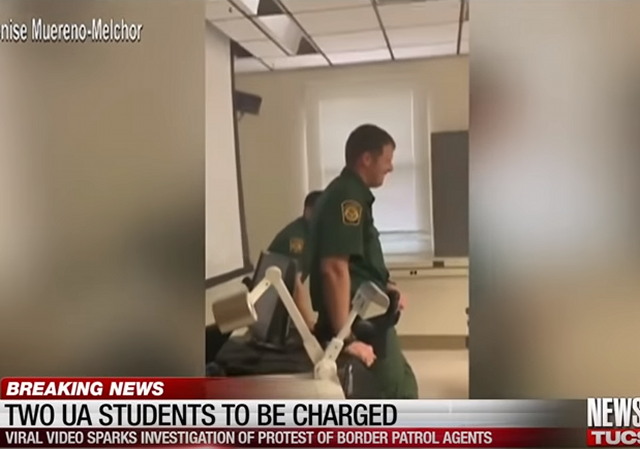FIRE Releases Statement About U. Arizona Students Charged for Harassing Border Patrol Agents
“guiding principles should be restated”

We ran a full post about this incident over the weekend. Read the full back story here.
FIRE has now released a statement:
FIRE statement on charges against University of Arizona students
For protesting the appearance of Border Patrol agents at a March 19 campus event, two University of Arizona students will reportedly face a misdemeanor charge of interference with the peaceful conduct of an educational institution. Per UA President Robert C. Robbins, both university administrators and university law enforcement are continuing to investigate the incident. More criminal charges and alleged student conduct code violations may follow.
While FIRE continues to gather facts, guiding principles should be restated.
As a public institution, the University of Arizona is fully bound by the First Amendment. The First Amendment protects the right of public college students to engage in peaceful protest. This right protects student speech that listeners may find deeply offensive. Taken alone, the content of the speech at issue here — calling Border Patrol agents “murder patrol” and “an extension of the KKK,” for example — is plainly protected by the First Amendment. Likewise, the call by a Border Patrol agent (with considerable political influence) to investigate and punish students for a letter criticizing the Border Patrol is a clear demand that the university violate the First Amendment.
The First Amendment also protects the right of public college students to hear from the speakers of their choice free from the heckler’s veto. Attempts to prevent a speaker from being seen and heard by an audience are not protected by the First Amendment. However, as FIRE has previously stated, isolated heckling, fleeting disruption, or other expressive activity that does not prevent audience members from seeing and hearing the speaker is generally permissible.
 DONATE
DONATE
Donations tax deductible
to the full extent allowed by law.









Comments
isolated heckling, fleeting disruption, or other expressive activity that does not prevent audience members from seeing and hearing the speaker is generally permissible.
Sez who? I wouldn’t say deliberate disruption is protected “speech” no matter how “fleeting”.
Heckling is a traditional part of political debate, and is certainly protected, provided it does not get disruptive. Which is what FIRE said.
Here’s a test: Suppose these hecklers were interrupting to support the speaker rather than oppose him; suppose they were cheering rather than booing, and calling the patrol nice names rather than ugly ones. Would you still have a problem with it? Would you still say “Shut up and let the guy speak”? In that case they’re being disruptive, at least in your estimation.
Heckling being permitted free speech is fine as it goes – but unless it is balanced by policy permitting expulsion from the room of disruptive heckling it permits hecklers to vilatevothers free speech rights.
Your right to freely swing your fists ends where someone else’s face begins.
Where is there not such a policy? Disruptive people can always be evicted from a private space, such as a room reserved for a lecturer. But in this case the disrupters were not in the room; they were shouting abuse from outside, through the open doorway, so there was nowhere to remove them from.
Calling the BP “murder patrol” may be an incitement to violence against their employees. If that is the case, they have the right to defend themselves “by whatever means neccessary”.
No, it may not. The law on incitement is crystal clear and you’re on the other side of it.
Would application of a cattle prod be considered an improvisational art form of dancing?
At any rate this part definitely seems correct: “Likewise, the call by a Border Patrol agent (with considerable political influence) to investigate and punish students for a letter criticizing the Border Patrol is a clear demand that the university violate the First Amendment.”